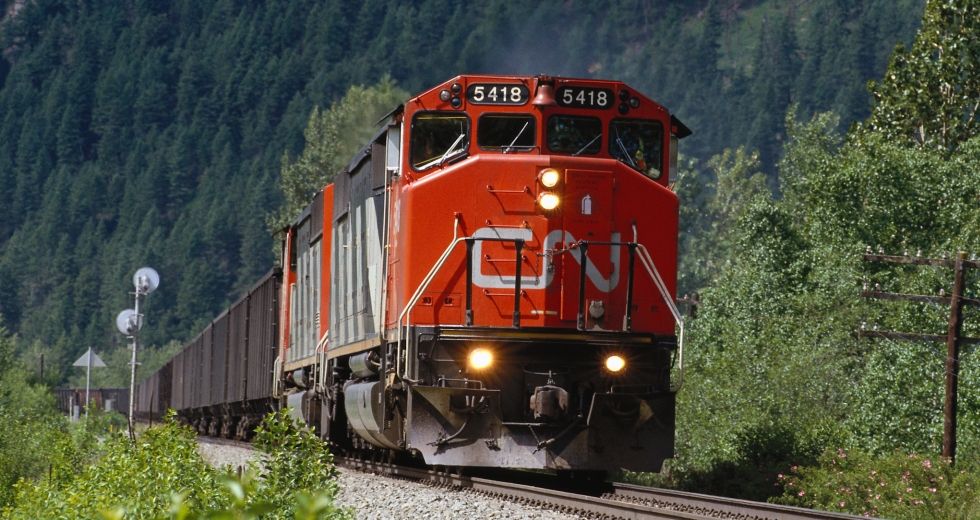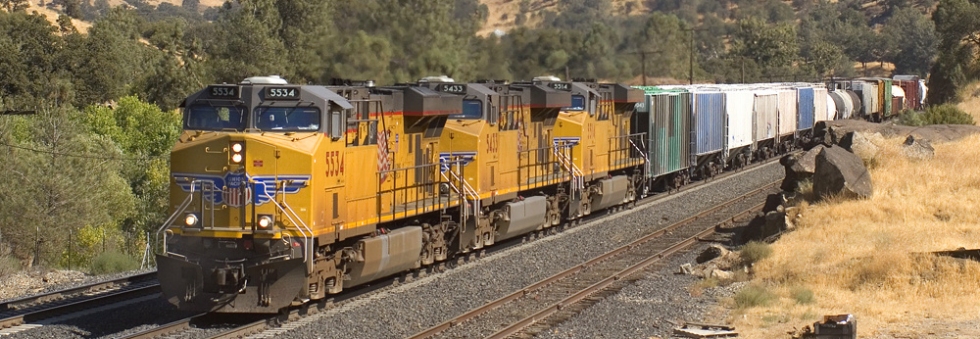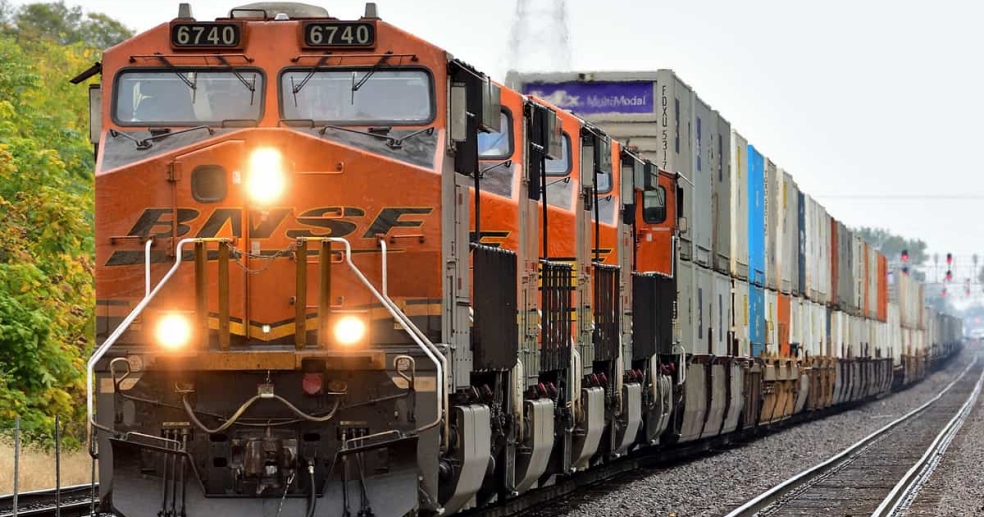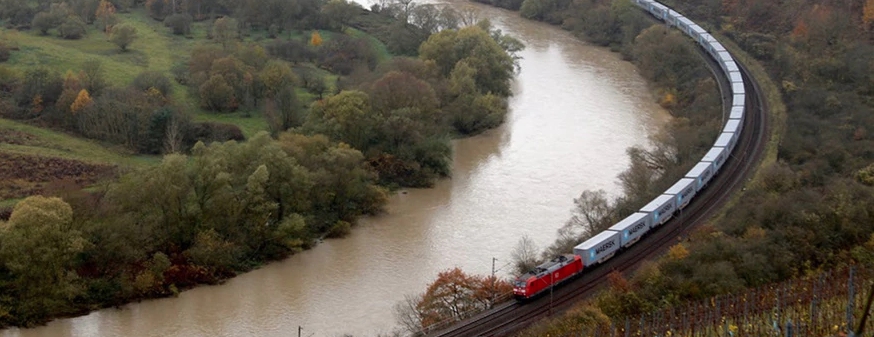|

CN Investing Nearly $1 Billion in 2020 to Support Capacity Growth, Maintenance and Safety in Canada
June 29, 2020 - CN (Canadian National Railway) announced that, as part of its strategic investments to support growing demand and enable supply chains, it plans to invest approximately $985 million (CAD) across Canada in 2020 on safety and capacity to strengthen rail network, help reduce emissions, and support economic growth.
British Columbia
CN said that it plans to invest approximately $445 million (CAD) across British Columbia in 2020. The investments will include expansion projects that will add track in yards to handle growing traffic, new sidings as well as continued investments in multi-year initiatives to increase capacity at the Port of Vancouver and at the Port of Prince Rupert in collaboration with the Government of Canada, the Vancouver Fraser Port Authority, and the Prince Rupert Port Authority. The maintenance program will focus on the replacement of rail and ties and maintenance work on level crossings, culverts, signal systems and other track infrastructure.
Planned expansion projects include:
- Construction of about 3.5 miles of double track between Vancouver and Edmonton, near Glen Valley.
- Building new sidings on the Edmonton to Prince Rupert corridor to increase capacity for growing demand.
- Continued investments to continue multi-year infrastructure projects that will increase capacity at the ports of Vancouver and Prince Rupert in collaboration with the Government of Canada, the Vancouver Fraser Port Authority and the Prince Rupert Port Authority.
Alberta
In the province of Alberta, CN, as part of its strategic investments to support growing demand and enable supply chains, plans to invest approximately $305 million (CAD). The investments will include expansion projects such as the construction of double track to allow more trains to pass on CN’s mainline. The maintenance program will focus on the replacement of rail and ties, as well as maintenance work on level crossings, bridges, culverts, signal systems and other track infrastructure.
Quebec
In Quebec, CN plans to invest approximately $235 million (CAD) in 2020. The investments include various information technology projects, Positive Train Control, the replacement of rail and ties, as well as the maintenance of level crossings, culverts, signal systems and other track infrastructure.
CN – Canadian National Railway Company, along with its operating railway subsidiaries – serves the cities and ports of Vancouver, Prince Rupert, B.C., Montreal, Halifax, New Orleans, and Mobile, Ala., and the metropolitan areas of Toronto, Edmonton, Winnipeg, Calgary, Chicago, Memphis, Detroit, Duluth, Minn./Superior, Wis., and Jackson, Miss., with connections to all points in North America. For more information about CN, visit the Company’s website at www.cn.ca. |
|
|

U.S. Rail Traffic Down 22 Percent for the Week Ending May 16
May 20, 2020 – The Association of American Railroads (AAR) today reported U.S. rail traffic for the week ending May 16, 2020.
For this week, total U.S. weekly rail traffic was 416,115 carloads and intermodal units, down 22 percent compared with the same week last year.
Total carloads for the week ending May 16 were 184,415 carloads, down 30.2 percent compared with the same week in 2019, while U.S. weekly intermodal volume was 231,700 containers and trailers, down 14 percent compared to 2019.
None of the 10 carload commodity groups posted an increase compared with the same week in 2019. Commodity groups that posted decreases compared with the same week in 2019 included coal, down 35,879 carloads, to 45,756; motor vehicles and parts, down 14,242 carloads, to 2,865; and metallic ores and metals, down 9,245 carloads, to 14,101.
Forest Products carloads for the week stood at 8,908, down 10.8% from the same week in 2019.
“The 30.2% decline in total U.S. carloads last week was the biggest year-over-year weekly decline for total carloads since 1988, when our data begin. Coal didn’t help: last week was the fifth straight week in which coal carloads were down at least 40% from last year,” said AAR Senior Vice President John T. Gray. “For many other key rail commodities, including chemicals, petroleum products, and crushed stone and sand, carloads last week were roughly the same as in the previous few weeks, while intermodal originations last week were the most in eight weeks.
“As the Covid-19 situation continues to evolve across the globe, North America’s freight railroads will remain focused on safeguarding the health and safety of their workforce while working tirelessly to maintain the flow of goods necessary to preserve public health, sustain families, and help the economy recover as quickly as the situation allows.”
For the first 20 weeks of 2020, U.S. railroads reported cumulative volume of 4,343,145 carloads, down 13.6 percent from the same point last year; and 4,732,813 intermodal units, down 11.4 percent from last year. Total combined U.S. traffic for the first 20 weeks of 2020 was 9,075,958 carloads and intermodal units, a decrease of 12.5 percent compared to last year.
North American Rail Traffic
North American rail volume for the week ending May 16, 2020, on 12 reporting U.S., Canadian and Mexican railroads totaled 263,409 carloads, down 29.2 percent compared with the same week last year, and 312,917 intermodal units, down 12.3 percent compared with last year. Total combined weekly rail traffic in North America was 576,326 carloads and intermodal units, down 20.9 percent. North American rail volume for the first 20 weeks of 2020 was 12,554,512 carloads and intermodal units, down 11 percent compared with 2019.
Canadian railroads reported 64,416 carloads for the week, down 25.4 percent, and 66,940 intermodal units, down 3.7 percent compared with the same week in 2019. For the first 20 weeks of 2020, Canadian railroads reported cumulative rail traffic volume of 2,800,429 carloads, containers and trailers, down 6.7 percent.
Mexican railroads reported 14,578 carloads for the week, down 32.3 percent compared with the same week last year, and 14,277 intermodal units, down 20.9 percent. Cumulative volume on Mexican railroads for the first 20 weeks of 2020 was 678,125 carloads and intermodal containers and trailers, down 7.8 percent from the same point last year.
SOURCE: Association of American Railroads |
|

Short-line Railroads Offer Appealing Investment Opportunity Even Amid Pandemic
May 12, 2020 (FREIGHTWAVES) - Private equity funds and other investors are scouring 35,000 miles of North American short-line rail track for deals even as the industry sees one of the biggest volume drops since 2008.
The hunt for acquisitions among the roughly 500 companies in the space comes as investors see first-mile access to shippers as the next smart way to deploy large pools of capital and the demand for railcar storage increases.
Brookfield Infrastructure Partners and GIC’s $8.4 billion acquisition of Genesee & Wyoming, the largest short-line operator with some 120 short-lines operating on 16,000 miles of track globally, stands out. Below that mega-deal, there are a host of smaller ones.
Since June 2018, there have been 19 acquisitions of short-line railroads or other closely held rail assets, such as transloading facilities, according to S&P Global Market Intelligence. A bit over half of those deals occurred this year. In October, U.K.-based 3i acquired the Florida operations of Pinsly Railroad, which owns 208 miles of track spread across three short-line operators serving Orlando and Tampa.
Pinsly is being folded into 3i’s Regional Rail acquisition made in April. Regional Rail is the parent company of three short-line railroads spanning Pennsylvania and New Jersey, covering 155 miles of track.
Australia’s First State Investments bought Patriot Rail and Ports, an operator of 12 short-lines over 585 miles of track across 14 southeastern states, from SteelRiver Infrastructure Partners in August.
In May 2019, a group including Related Companies, Brookhaven Capital Partners and investment bank Stephens, acquired Pioneer Railcorp, the owner of 15 short-lines covering 12 states. The group said that Pioneer will become a “platform investment” with additional capital to be committed for growing Pioneer’s trackage and customer base.
Platform investments are also a strategy of RailUSA, an operating company that received a $200 million injection in 2018 from Equity Group Investments, a fund controlled by billionaire Sam Zell, and International Rail Partners.
RailUSA acquired 430 miles of track in the Florida panhandle from CSX earlier this year, its second acquisition after buying Grenada Railroad, a 212-mile line between Memphis and Canton, Mississippi.
RailUSA Chief Executive Gary Marino cited the potential to get closer to customers and the ability to offer railcar storage as keys to the acquisition.
“We see a substantial opportunity to enhance the suite of services we offer [customers], as well as to attract new customers with concentrated local services,” Marino said at the time.
Denver-based infrastructure fund Broe Group was also active this year through its operating company, OmniTRAX, the second-largest U.S. short-line railroad operator. OmniTRAX did three acquisitions, the biggest being the $105 million deal for the Winchester & Western Railroad, which serves the Virginias, Maryland and New Jersey.
“The Broe Group and OmniTRAX are very bullish,” said OmniTRAX Chief Executive Officer Keving Shuba. “We continue to think rail is an efficient mode of freight. And it can continue to gain market share from trucks.”
Read the complete story at FREIGHTWAVES |
|

Surface Transportation Board Issues Three Decisions Related to Demurrage Rules and Charges
May 5, 2020 - The Surface Transportation Board today announced that it is issuing a series of decisions on demurrage and accessorial rules and charges, continuing its efforts to promote transparency, timeliness, and mutual accountability by rail carriers and the shippers and receivers they serve. Informed by the significant number of comments received during the notice-and-comment process, the Board issued three related decisions today.
In Policy Statement on Demurrage & Accessorial Rules & Charges, Docket No. EP 757, the Board issued a final policy statement that provides the public with information on principles the Board would consider in evaluating the reasonableness of demurrage and accessorial rules and charges. With the policy statement, the Board intends to facilitate more effective private negotiations and problem solving between rail carriers and shippers and receivers, to help prevent disputes from arising, and to help resolve disputes more efficiently and cost-effectively.
In Demurrage Billing Requirements, Docket No. EP 759, the Board issued a final rule requiring Class I carriers to directly bill the shipper for demurrage when the shipper and warehouseman agree to that arrangement and notify the carrier. The Board intends the rule to help ensure the responsibility for demurrage is placed on the party in the best position to expedite the loading or unloading of rail cars.
Also, in Demurrage Billing Requirements, Docket No. EP 759, the Board issued a supplemental notice of proposed rulemaking (SNPRM) inviting parties to comment on certain modifications and additions to the proposed requirements for minimum information to be included on or with Class I carriers’ demurrage invoices. The SNPRM proposes to include additional information such as:
(1) the date range (i.e., the billing cycle) covered by the invoice;
(2) the original estimated date and time of arrival and the date and time cars are received at interchange;
(3) the ordered-in date and time; and (4) machine-readable data.
The Board also invited further comment from the Class I carriers regarding what actions they currently take, and from all stakeholders on what actions Class I carriers reasonably should be required to take, to ensure that demurrage invoices are accurate and warranted. The intent of this proceeding is to ensure that the recipients of demurrage invoices will be provided sufficient information to readily assess the validity of those charges without having to undertake an unreasonable effort to gather information.
The final policy statement will be effective on May 30, 2020, and the final rule in Demurrage Billing Requirements will be effective on June 20, 2020. Comments on the SNPRM in Demurrage Billing Requirements are due by June 5, 2020, and replies are due by July 6, 2020.
The Board’s decision in Policy Statement on Demurrage & Accessorial Rules & Charges, Docket No. EP 757, may be viewed and downloaded here. The Board’s final rule in Demurrage Billing Requirements, Docket No. EP 759, may be viewed and downloaded here, and the SNPRM in Demurrage Billing Requirements, Docket No. EP 759, may be viewed and downloaded here.
About STB
The Surface Transportation Board is an independent federal agency (USA) that is charged with the economic regulation of various modes of surface transportation, primarily freight rail. The agency has jurisdiction over railroad rate, practice, and service issues and rail restructuring transactions, including mergers, line sales, line construction, and line abandonments. For further informatin, visit: prod.stb.gov
SOURCE: Surface Transportation Board |
|

Maersk Launches New Intermodal Container Service in Russia
April 22, 2020 - Maersk’s offer of intermodal solutions for the Russian market is expanding, with the new container service launched in April, connecting the port of Novorossiysk on the Black Sea with the dry port Vorsino near Moscow (Kaluga region). The new service is offered by Maersk jointly with Russian partners Ruscon group and Transcontainer JSC and offers a reliable solution for containers arriving to Novorossiysk on Maersk’s ocean services and destined for customers in Moscow and neighbouring regions. At destination, customers can then choose between an end-to-end solution, where containers are delivered by Maersk directly to their premises, and self-pickup from Vorsino inland container terminal.
“With this solution, we want to meet the needs of our customers located in the Russian capital area with a product that brings their cargo closer to their warehouses, production facilities or shops. We offer them the flexibility of picking up their cargo on their own, or using a door-to-door option, based on their preference”, comments Zsolt Katona, Managing Director of Maersk in Eastern Europe.
The service was launched in test mode already in January 2020, and since then has been structured with a weekly frequency, as originally planned. Transit time from Novorossiysk port to destination is 50 hours. The train is dispatched from the Novorossiysk terminal every Thursday at 5 am and reaches Vorsino on Saturdays at 7 am.
About Maersk
A.P. Moller - Maersk is an integrated container logistics company working to connect and simplify its customers’ supply chains. The company operates in 130 countries and employs roughly 76,000 people. Its mission is to enable and facilitate global supply chains and provide opportunities for our customers to trade globally.
SOURCE: Maersk |
|
|